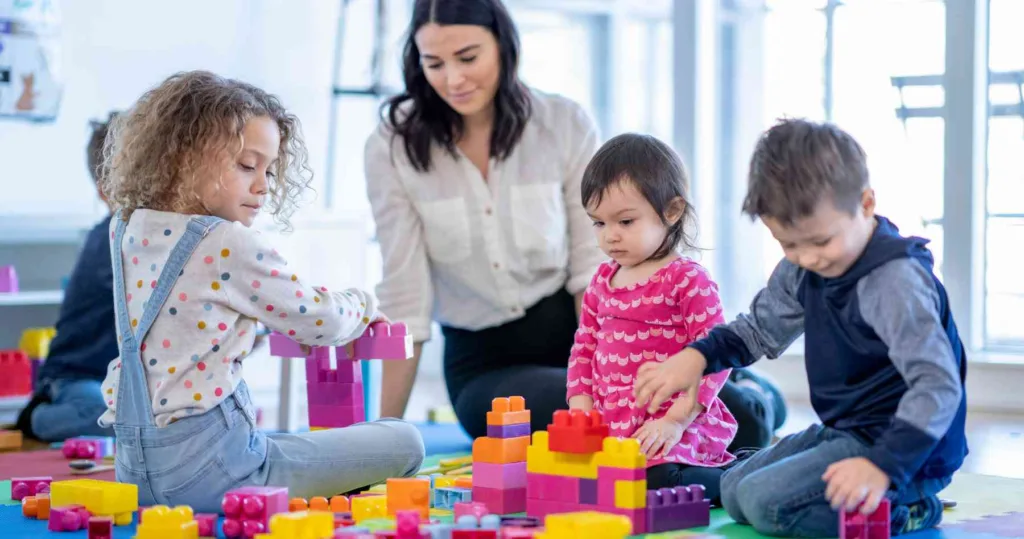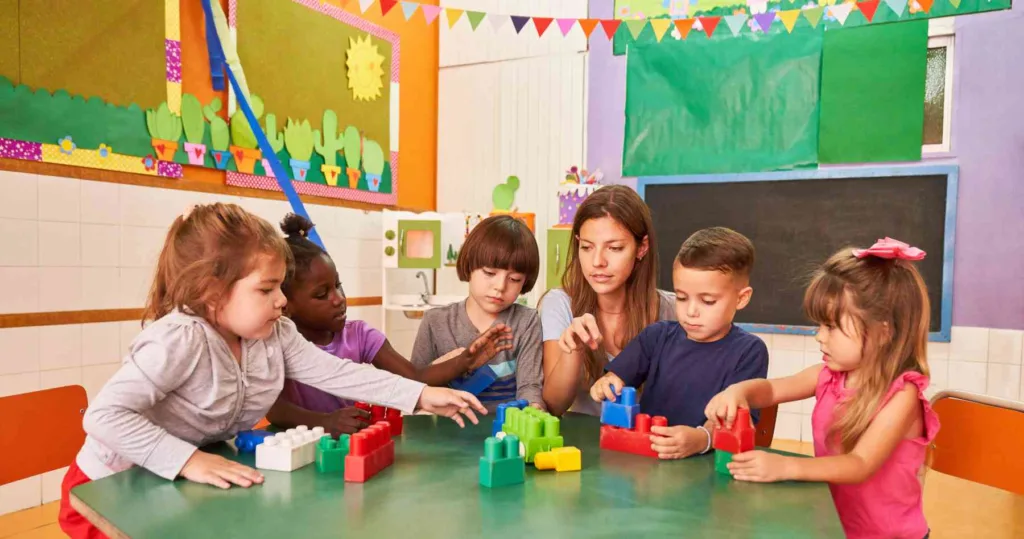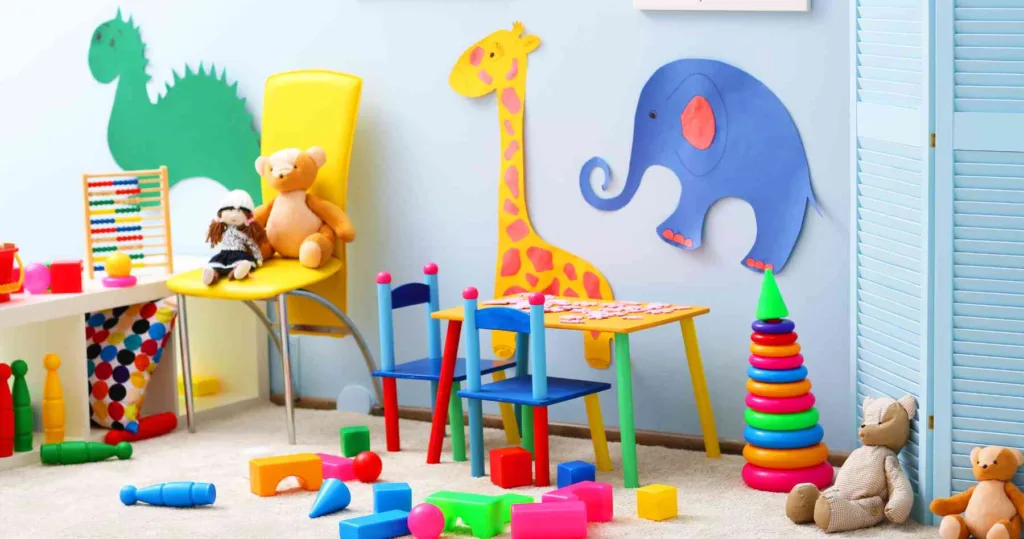Unique Approach to Play-Based Learning: Unleashing the Power of Creative Problem-Solving
Unlock the Power of Play-Based Learning with Creative Problem-Solving
Are you looking for a unique approach to education that engages your child’s creativity, problem-solving skills, and social interactions? Look no further than AppleBee Kids, where play-based learning takes center stage. In this article, we will explore the play-based learning approach followed by AppleBee Kids, delve into the benefits of play in child development, provide examples of interactive activities at AppleBee Kids, and emphasize how play enhances creativity, problem-solving skills, and social interactions. Join us on this exciting journey as we uncover the transformative power of play.
A World of Exploration Awaits
Play is the language of childhood, a universal medium through which children make sense of the world around them. At AppleBee Kids, we recognize the immense potential of play in fostering holistic development. By harnessing the innate curiosity and imagination of children, we create an environment where learning becomes an adventure. Our unique approach to play-based learning cultivates a love for exploration, discovery, and critical thinking, setting the stage for lifelong learning. So, let’s dive in and discover how play can transform education through creative thinking and problem solving!
The Benefits of Play in Child Development
Play is not just a frivolous activity; it is a vital component of a child’s development. Research has shown that play-based learning offers numerous benefits across various domains. Let’s explore some of the key advantages in problem solving and creativity in facilitating learning:
Cognitive Development: Play engages children in problem-solving tasks, encourages abstract thinking, and enhances memory and concentration. Through play, children develop essential cognitive skills that lay the foundation for future academic success.
Social and Emotional Development: Play provides a platform for children to practice social skills, such as cooperation, communication, and empathy. It fosters emotional regulation and resilience, helping children navigate the complexities of relationships and emotions.
Physical Development: Active play promotes gross motor skills, coordination, and physical fitness. Whether it’s running, jumping, or climbing, children strengthen their bodies while having fun.
Language and Literacy Skills: Play-based activities stimulate language development, vocabulary acquisition, and storytelling abilities. Children engage in conversations, express their ideas, and develop a love for reading and writing.
Creativity and Imagination: Play fuels creativity by allowing children to explore their imaginations, experiment with different roles, and invent new scenarios. It nurtures original thinking, problem-solving, and innovation.
Interactive Activities at AppleBee Kids: Unleashing the Playful Spirit
At AppleBee Kids, we believe that learning should be an immersive and joyful experience. Our dedicated team of educators designs a wide range of interactive activities that foster play-based learning. Here are some examples of the engaging activities your child can enjoy:
1. Storytelling Adventures
Through storytelling sessions, children embark on exciting journeys to faraway lands, imaginary worlds, and historical events. These adventures ignite their imagination, enhance language skills, and cultivate a love for literature.
2. Sensory Exploration
Sensory play engages all the senses, providing children with opportunities to explore different textures, colors, smells, and sounds. From finger painting to playing with sand and water, sensory activities stimulate brain development and promote creativity.
3. Role-Playing and Pretend Play
Role-playing allows children to step into different roles, such as doctors, chefs, or firefighters. By assuming these roles, they develop social skills, empathy, and an understanding of different perspectives. Pretend play fosters creativity, problem-solving, and critical thinking.
4. STEM Adventures
Incorporating science, technology, engineering, and mathematics (STEM) into play-based learning, we encourage children to engage in hands-on experiments, building structures, and problem-solving challenges. STEM adventures nurture curiosity, logical thinking, and analytical skills.
5. Outdoor Explorations
We believe in the power of nature to inspire and educate. Outdoor activities, such as nature walks, gardening, and exploring the environment, provide children with firsthand experiences, connecting them to the natural world and promoting physical fitness.


Get In touch
Leave us a message
4 Claret Road, Table View, 7441
(021) 556 4146
office@applebeekids.com
How Play Enhances Creativity, Problem-Solving Skills, and Social Interactions
Play is a natural breeding ground for creativity, problem-solving, and social interactions. Let’s explore how play enhances these crucial aspects of a child’s development:
Creativity Unleashed
When children engage in imaginative play, their creativity flourishes. Whether they are building a castle with blocks, painting a masterpiece, or inventing stories, play allows them to explore their unique ideas, make connections, and think outside the box. By fostering creativity, we empower children to become innovative thinkers and problem solvers in all areas of life.
Problem-Solving in Action
Play-based learning provides children with opportunities to encounter and solve real-life problems in a safe and supportive environment. Whether it’s building a bridge with limited resources or collaborating with peers to design a game, children develop essential problem-solving skills, such as critical thinking, decision-making, and perseverance.
Social Connections
Play is a social activity that brings children together, fostering meaningful connections and friendships. During play, children learn to navigate social dynamics, negotiate, compromise, and resolve conflicts. They develop empathy, emotional intelligence, and the ability to understand and respect diverse perspectives.

Unlocking the Power of Play
AppleBee Kids’ unique approach to play-based learning harnesses the transformative power of play, unlocking the full potential of children’s creativity, problem-solving skills, and social interactions. By immersing children in a world of exploration and discovery, we foster a love for learning that lasts a lifetime. So, embrace the unique approach to play-based learning, and watch your child’s potential soar.
FAQs About Play-Based Learning at AppleBee Kids
Q: What age group is play-based learning suitable for?
Play-based learning is suitable for children of various age groups, starting from early childhood through primary education. At AppleBee Kids, we tailor our play-based activities to cater to the developmental needs and interests of different age groups.
Q: Is play-based learning effective for academic success?
Yes, play-based learning lays a strong foundation for future academic success. By engaging children in hands-on, experiential learning, it enhances their cognitive abilities, critical thinking skills, and love for learning. Play-based learning creates a positive attitude towards education and fosters a lifelong love of exploration.
Q: How does play-based learning promote creativity?
Play-based learning promotes creativity by providing children with opportunities to express their imagination, explore new ideas, and engage in open-ended activities. It encourages divergent thinking, problem-solving, and innovation, essential components of creative thinking.
Q: Can play-based learning be incorporated into homeschooling?
Absolutely! Play-based learning can be seamlessly integrated into homeschooling routines. Parents can design engaging play-based activities that align with their child’s interests and learning goals. By combining structured learning with play, parents can create a dynamic and effective educational experience.
Q: What role do educators play in play-based learning?
Educators play a vital role in facilitating play-based learning. They create a supportive environment, provide guidance and encouragement, and scaffold children’s learning experiences. Educators observe children’s play, identify teachable moments, and engage in meaningful interactions that enhance learning outcomes.
Q: How can parents support play-based learning at home?
Parents can support play-based learning at home by providing open-ended materials, fostering a playful environment, and engaging in joint play experiences with their children. They can also encourage imaginative play, read books together, and integrate play into daily routines.
